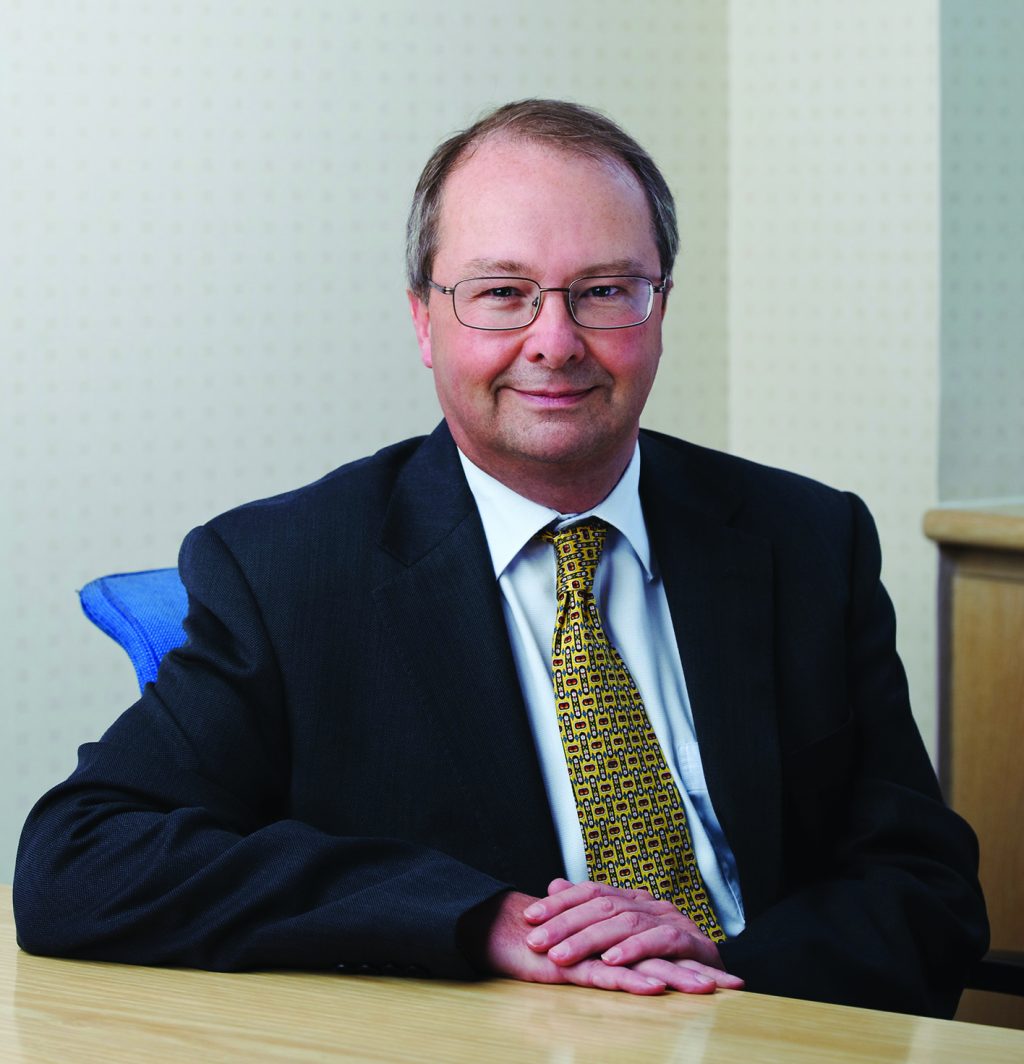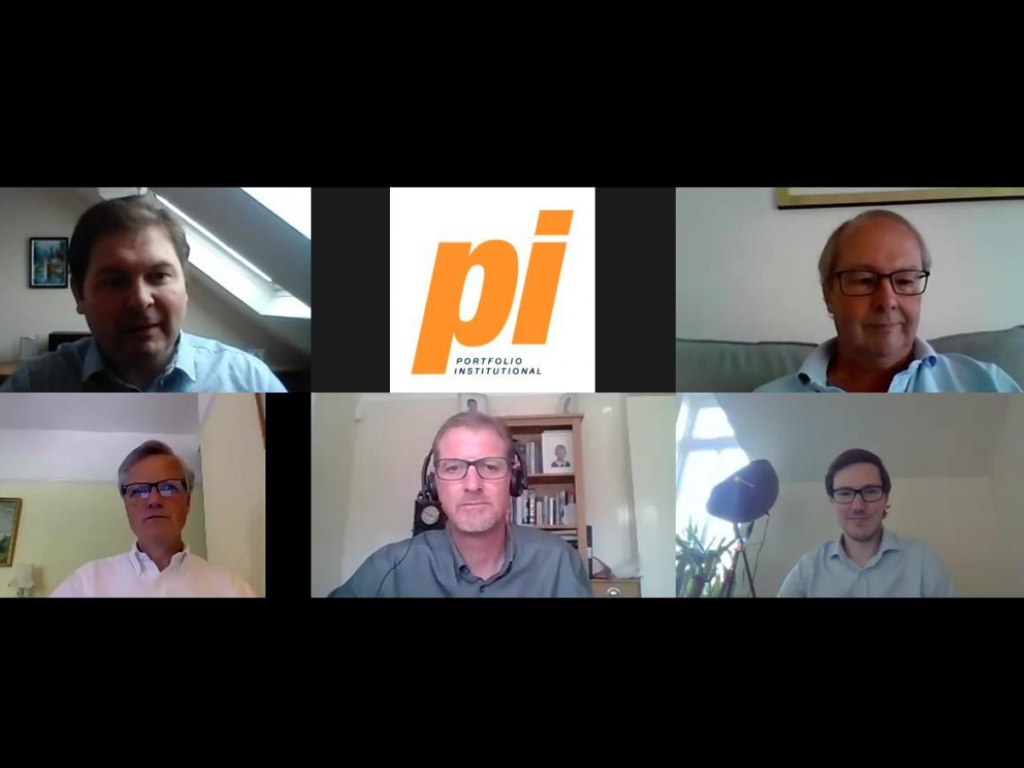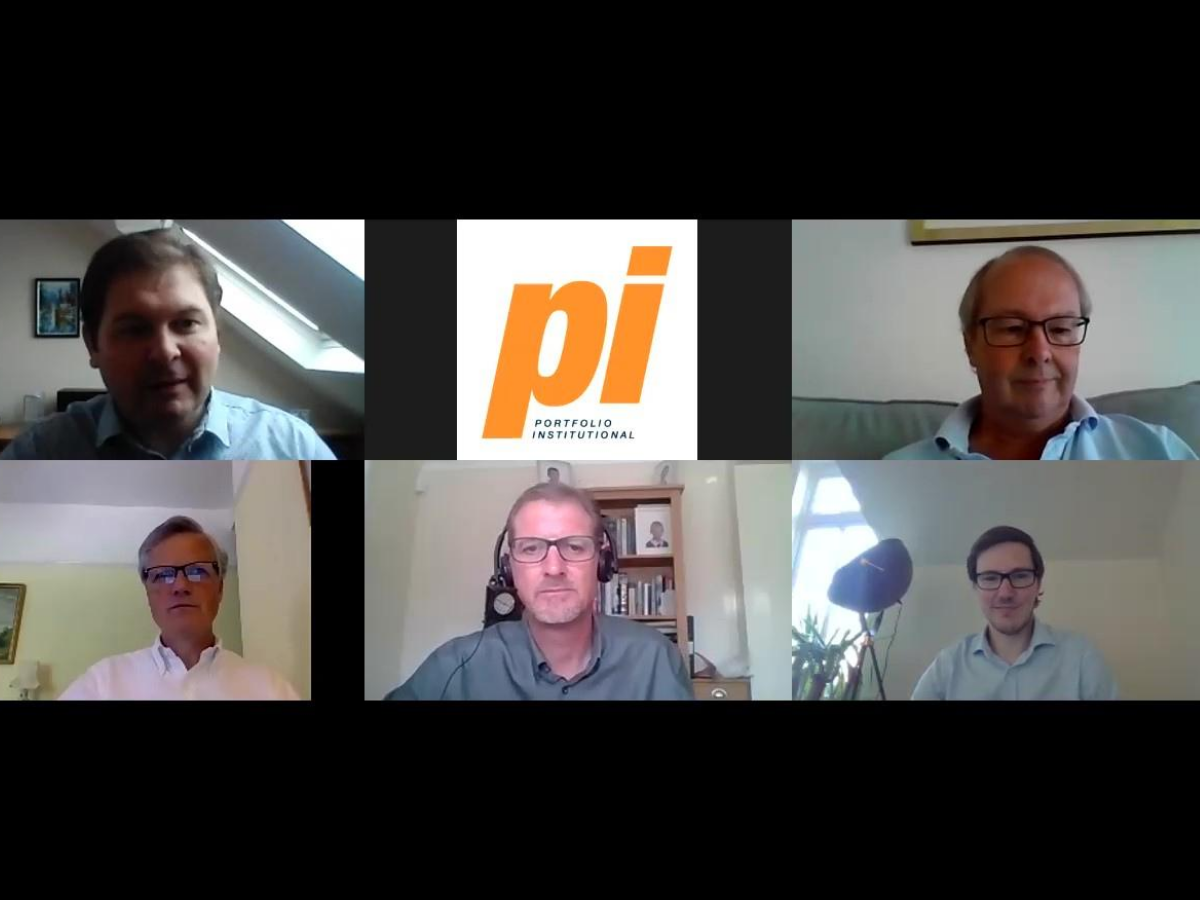We are living in interesting times. The COVID virus, largely unheard of on New Year’s Day, has guaranteed that 2020 gets its own chapter in the history books.
It has claimed hundreds of thousands of lives across the world and has caused economic chaos. Indeed, in the UK since March we have seen two cuts to interest rates, an emergency budget, the national debt being higher than GDP and the economy contracting by a fifth in April – a monthly record.
To find out how those responsible for paying our pensions on time and in full are reacting to this upheaval and uncertainty, we brought pension scheme trustees together with professional trustees to discuss how they are investing during the pandemic.
The following article is based on a conversation that took place in June.
The Panel

Andy Cheseldine is a professional trustee at Capital Cranfield. He sits on the trustee boards of defined contribution (DC) schemes, including those for Yorkshire & Clydesdale Bank and Vodafone, and defined benefit (DB) schemes, such as Mizuho International. He is the trustee chair of Smart Pension Master Trust.

Gerald Wellesley is a professional trustee at PSGS. He sits on the trustee boards of master trusts and DB schemes.

Neil Mason is a strategic finance manager at Surrey County Council. He is responsible for the Surrey Pension Fund, which has 100,000 members and is valued at around £4.3bn.
Mason is also an independent member of the London Borough of Hounslow’s pensions board.

Andrew Stephens is an investment specialist for British Airways’ defined benefit schemes: The Airways Pension Scheme and The New Airways Pension Scheme.
Pandemic performance
How a scheme is positioned going into the crisis will have a big say in how it performing during it.
Surrey Pension Fund was in a good position when the pandemic arrived, but this soon changed. It was fully funded, according to its March 2019 valuation, making it worth £4.5bn. However, at one point during the pandemic it fell to £3.7bn, before recov- ering to £4.3bn.
“We are an open scheme with free-cashflow and no immediate concerns on our income,” says Neil Mason, head of pensions at Surrey County Council. “We suffered significant losses to the portfolio, but we are still delivering on our long-term invest- ment strategy and meeting our funding targets.”
Some schemes, meanwhile, suffered a double whammy from the pandemic, says Andrew Stevens, an investment specialist for British Airways’ (BA) final salary schemes. “The volatility was punishing for equity holders and risk assets,” he adds. “Combined with gilt yields falling, so liabilities increased, it was not great for defined benefit schemes, depending on strategy.”
BA has two final salary schemes, which have reacted differently to the crisis.
The Airways Pension Scheme is the more mature of the two. It is cash-flow negative and closed to new members. The scheme is advanced in its de-risking journey being 90% hedged on lon- gevity and has protection against rates and inflation.
“That is close to its endgame and there was not much of a material impact from the volatility, around a 1% reduction in funding due to its hedging,” Stevens says. “That is one story.” The other story centres on the New Airways Pension Scheme, which is less mature. It closed to accrual in 2018 and has a dif- ferent strategy. Around 45% of its assets are return seeking and its liabilities are not hedged.
“Falling gilt yields were only partially offset by our hedging,” Stevens says. “Like a lot of schemes, it was more effected by the falls in equities and spreads widening. Its funding fell around 10% and we have recovered around half of that.
“There are different stories depending on what scheme you are looking at,” he adds
The schemes professional trustee Gerald Wellesley works with tend to be underfunded. Most of these schemes have been rid- ing through the pandemic. However, one of his mature, cash- flow negative funds was 60% invested in equities, half of which was hedged. When the market started to recover, they turned some of their un-hedged assets into cash.
“We took a view that there might be another dip in the market and didn’t want to be liquidising further equities later on, so being better hedged at these sterling levels might be a good thing,” Wellesley says. “Now we are pretty comfortable.
“The assets we sold were about 10% down on their value at the beginning of the year, which was better than the 27% we suf- fered across the portfolio,” he adds.
Wellesley points to changes in the prices of gold and gilts as examples of how difficult it is to call the market right during this pandemic. “As a pension trustee, I have been loath to make tactical decisions other the one I mentioned, which was for cash-flow reasons.”
Another professional trustee, Andy Cheseldine of Capital Cran- field, also reports that the pandemic has hardly made a differ- ence to his schemes that are liability matched. “If they are not, there has been a lot of volatility and I wouldn’t want to make tactical investments if you have not done it before,” he says.
It is a different story for Cheseldine’s defined contribution (DC) schemes. “DC has come out of it pretty well,” he says. Most of his DC members are in lifestyle. Through the worst of the market in early April, those who are less than two years away from retirement saw the value of their fund improve.
“If you are younger and you have seen a 20% or 30% drop in the value of your fund, but are 20, 30 or 40 years away from retirement, it is irrelevant and possibly an advantage because you are buying cheap,” he points out.
Wellesley agrees that younger DC investors could actually ben- efit from this volatility. “For those far from retirement, for rea- sons including pound-cost averaging, could end up doing slightly better,” he adds
Bargain hunters?
Post Covid, the world will be different. We are unlikely to sim- ply pick up where we left off in March when most of the world was ordered to stay at home. Where we buy our clothing, gadg- ets and food from may change and there are questions around if office workers could continue typing away at the kitchen table when we get the all-clear.
With so much change happening are investors looking to take advantage of volatility to re-position their exposures. “Everyone is looking for what the long-term trends might be,” Cheseldine says.
Some industries are expected to suffer from the pandemic, such as airlines, hotels and cruise operators. “The businesses with good balances sheets will probably survive and do well longer term because their competition will go out of business,” he adds. “There is an element of stock picking in that, but you have to make use of the professionals.
“There is an old line that if you have never picked stocks before why do you think you are suddenly so good at it. Think about what you are trying to do. If you are a passive investor, stick at that.
“At the moment we are waiting on things subsiding,” Cheseldine says about how his schemes are approaching the changing world and economic uncertainty.
Wellesley has personally picked up some bargains during the period but says that he would not want to do it as a trustee. “One has the weight of responsibility of the membership on your shoulders. Picking the winners and losers sounds easy but finding them and making sure that there continues to be value if someone has not got their first is a tricky one.
“If your time horizon is long then volatility is not risk. If you need the money soon then volatility is risk,” he adds.
“The tendency for the schemes I am involved with to look through this crisis, and acknowledged that there might be a second wave and further trouble in the markets, the view is that it is difficult to try to outsmart the market,” he adds. Mason says that his scheme made an early decision to be over- weight in cash, but it seems that one change in the market was enough to tempt he and his colleagues to invest. “We have seen some opportunities with the current credit spreads, so we are overweight multi-asset credit. We have deployed some of our cash recently in that area,” Mason says.
BA has not made any changes in response to what has hap- pened, and it seems the trustees are in no hurry to find new assets. “Are there any bargains? Is this the right time to snap something up?
The re-evaluation of illiquid assets will be a lingering effect of the pandemic.
Gerald Wellesley, PSGS
“For me, it is only a bargain if you need or want those assets. Think of it in terms of is it part of your target allocation or strategic framework,” Stevens says.
“If this is good time to get into high yield and high yield is not part of your plan then that is a tactical decision,” he adds. “We are not going tactical and making off-piste decisions.”
There are other issues to consider if a scheme is tempted to invest during such volatility. How are they going to fund these transactions and the costs that come with them?
Wellesley agrees that funding new investments could be a problem if you do not have the cash.
“If you are snapping up a bargain you may have to sell something else but is it the right time to sell
“Credit spreads widened substantially for a short period of time so you have to be on the ball to have captured the majority of the value that was on the table for a brief period,” Wellesley says. “You needed to have your finger on the red trading button and also be pretty smart.”
Funding a few bargains is easier for DC schemes with Cheseldine pointing out that the industry is cash-flow positive with a “raft of contributions” regularly coming in. “Now is potentially a time to make investments into ESG or something that we think is a long-term good bet,” he adds.
Funding the re-launch
The pandemic has increased the pressure health services and businesses, which means governments have to find the capital to support such services and get their economy moving again. To help, they and coroporates have turned to a new class of debt, which has become known as Covid bonds.
Mason has looked at these bonds but decided they do not fit
with the scheme’s long-term strategic asset allocation. “We have not given it serious consideration,” he says.
What Surrey has mapped are the alphabet of recoveries and how the situation is evolving. “A “W” recovery is generally seen as the highest probability. That situation will only play out towards the end of the year where the likelihood of a second wave is higher. We will react to that,” Mason says.
“We are playing on the probability of there being a “W” shaped recovery and our strategy is reflecting that,” he adds. Cheseldine believes that these new bonds should be known by a different name. “Without wanting to be too gloomy, you could call Covid bonds gilts. On a passive basis you are lending to the whole of the economy,” he adds. “If you get into stock Covid bonds you are getting into a world of risk and the point is, do you understand what you are getting into?”
Wellesley points out that schemes already have an investment strategy and to consider something new would need to go through a review of the asset allocation, which is something that tends to happen on a scheduled basis.
Long-term changes
Cheseldine has been through a stock market crash or funda- mental financial crisis every decade since he joined the indus- try in the 1970s. “This one feels a little different,” he says, “because of the nature of it.
“There will be big changes to pension schemes,” he adds. “We will have to think about where we are investing for the future.”
Cheseldine adds that investors who are matching their liabili- ties in gilts or bonds will probably be okay as will derivatives, depending on who is the counterparty. “It is when you get into growth seeking assets that you will have to be more careful. “[From an investment perspective] there will be winners and losers out of the pandemic,” he adds.
Wellesley urges investors not to forget about liquidity. There was a time when pension funds who did not need the money were advised to lock in the illiquidity premium on certain assets. Yet the scramble for cash in March showed just how much of a problem illiquid assets can be. “The re-evaluation of illiquid assets will be a lingering effect of the pandemic,” he says.
Another issue, he points out, which is more fundamental for pension funds, is that interest rates have been falling for 30 years. He points to five-year gilts being negative, 10-year gov- ernment debt offering 22 basis points and 30-years paying 0.69.
“Is that a good asset for pension funds to invest in? he asks. “If you are hedged, fine. If not, your upside is that interest rates go down further but the yield you collect on them in the mean- time is meagre and puts more pressure on sponsors.
“It is going to be an interesting dynamic where the relationship between equities and bonds, which worked well during the cri- sis, has to end at some point and over the next few years, depending on the path of interest rates, perhaps a re-evaluation of that old adage that if your fixed income assets are not able to return an adequate investment return what else is there? “Equities have their own issues but tend to be where people end up when they cannot find anything else that looks like it will deliver the growth they need.
“So, there will be long-term lingering effects as a result of that and it is difficult to read where we will end up,” he adds. Issues such as liquidity, leverage and counter-party risk should have been looked at by schemes, but the crisis will see these issues come to the fore more in future, Stevens believes.
On the long-term damage to pension schemes issue. “A lot of pension schemes would have taken a hit on their funding position but when you project that into the future you will see a lot of investment houses that might make allowance for higher returns from certain assets. There is a little bit of a countering factor that in credit and equities, for example, you have probably seen some of that increased return come through. Forward looking assumption might be making higher returns now.”
Staying sustainable
ESG has become a mainstream investment strategy in recent years and market volatility linked to the pandemic is seen as a real test of investor bullishness for sustainable strategies.
ESG is a critical part of Surrey’s risk matrix. “The situation in China asks serious questions, particularly of the S part of ESG,” Mason says. “As a fund we have been on the front foot with this by mapping the portfolio against the UN’s Sustainable Development Goals to inform our decision-making committee in how they develop the core investment beliefs that will drive us through to the next stage of our strategy planning.
ESG credentials have remained strong as ESG-tilted funds are underweight oil, and industry that has been in crisis during the crisis.
“The bigger picture with ESG,” Wellesley says, “is that the mar- ket realises an ESG-focused fund will not only be good for us all but will deliver better financial results.
“The fact that the road test worked in Covid, however relevant that is, will be helpful to the long-term trend, which is under- pinned by regulatory change.”
He adds that while DB schemes have taken this seriously for some time its merits are now reaching DC schemes. “Every master trust, whether they like it or not, is having this front and centre of the agenda from an investment point of view.” Mason says that the new stewardship code requires managers of capital “to not just take ESG seriously and give lip service to it but set tangible metrics that we are reporting to”.
Stevens adds that a lot of focus and resource has gone on the Covid response but ESG has not dropped off his schemes’ agenda and it is still an important focus. “Covid was another thing to think about, but it has not changed the direction of travel,” he adds.
Also expecting the social pillar of ESG to be more prominent post-Covid is Wellesley. “The social side of things will be interesting in that will company behaviours through the downturn towards their employees and suppliers end up having a greater proportion of the argument in future or not. We will see how that plays out.”





